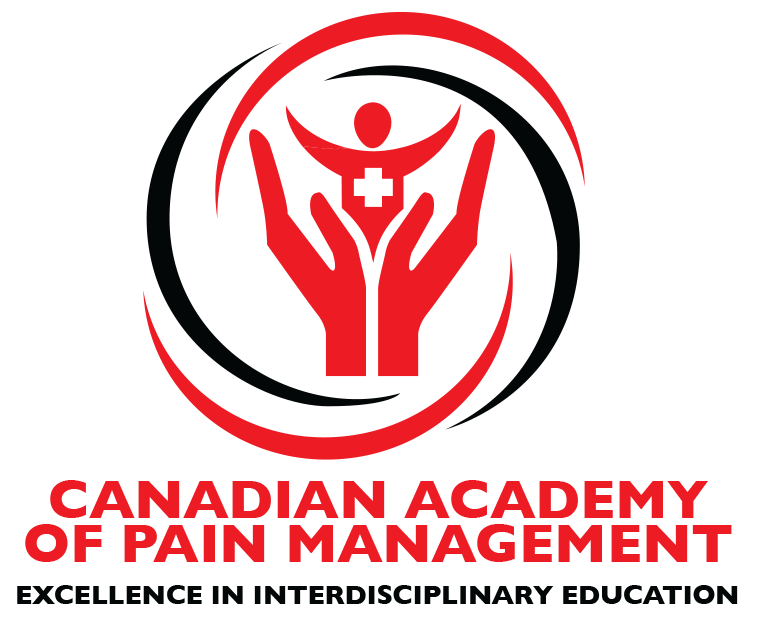Credentialing
There are two types of credentialing for qualified Canadian Academy members. Diplomate Credentialing and Advanced Credentialing.

"Consistent communication between patients and clinicians is essential, as it helps ensure that pain levels are monitored, treatments are adjusted safely, and side effects are identified early."


DIPLOMATE CREDENTIALING OF CAPM MEMBERS
Credentialing is a mark of approval by the professional organization CAPM that the member has achieved recommended standards of professional development and experience in pain management.
Four Options:
Through CAPM Credentialing courses and being member of CAPM Credentialing Stream
Online through the University of Alberta Pain Certificate program curriculum
Online through the McGill School of Physical and Occupational Therapy
Advanced Credentialing through CAPM
1. CAPM CREDENTIALING THROUGH COURSES
The Credentialing Course offers healthcare professionals in Canada an opportunity to enhance their knowledge and skills in pain management while earning valuable Continuing Medical Education (CME) credits. Designed for licensed healthcare professionals in good standing with their Canadian regulatory body. The course provides in-depth coverage of key topics that are directly applicable to clinical pain practice. Achieving Diplomate status (DCAPM) through the course requires applicants to submit a comprehensive set of documentation, including a copy of their current licensure, their highest relevant academic degree, and a detailed curriculum vitae that demonstrates at least two years of significant practice in pain management. In addition, applicants must provide three letters of recommendation from peers attesting to their expertise and active involvement in pain care, and they must be a current member at the regular membership rate. Once awarded, the DCAPM Diplomate status is valid for four years, serving as a recognized credential that reflects a healthcare professional’s commitment and proficiency in the field of pain management. To keep the status in good standing throughout the four-year period, healthcare professionals are required to renew their membership at the regular membership rate. After the four yours the member can apply to recredential. Overall, the DCAPM credential not only validates clinical experience and dedication but also positions healthcare professionals as recognized experts in pain management, supporting both professional development and enhanced patient care.
2. ONLINE THROUGH THE UNIVERSITY OF ALBERTA PAIN CERTIFICATE PROGRAM
The Canadian Academy of Pain Management (CAPM) accepts completion of the Alberta Pain Certificate Program as meeting the requirements for the DCAPM Diplomate Credentialing status. Applicants must submit their program transcripts with a passing grade along with supporting documents, including a current licensure, their highest relevant degree, and a detailed CV showing at least two years of substantial experience in pain management. Additionally, three letters of recommendation from professional peers are required to confirm the applicant’s expertise and active involvement in pain care. Applicants must also hold a CAPM membership at the regular membership rate. The DCAPM Diplomate credential is valid for four years, representing a recognized standard of knowledge and commitment in pain management. To maintain the credential, healthcare professionals must continue to renew their CAPM membership during the four-year period at the regular membership rate. After the four yours the member can apply to recredential.
3. ONLINE THROUGH THE MCGILL SCHOOL OF PHYSICAL AND OCCUPATIONAL THERAPY
The Canadian Academy of Pain Management (CAPM) recognizes completion of the McGill School of Physical and Occupational Therapy pain management program as meeting the requirements for DCAPM Diplomate Credentialing status. Applicants must submit their program transcripts showing a passing grade, along with supporting documents, including a current professional license, their highest relevant degree, and a detailed CV demonstrating at least two years of substantial experience in pain management. In addition, three letters of recommendation from professional peers are required to confirm the applicant’s expertise and active engagement in pain care. Applicants must also hold a CAPM membership at the regular membership rate. The DCAPM Diplomate credential is valid for four years and serves as a recognized standard of knowledge and commitment in pain management. To maintain the credential, healthcare professionals must renew their CAPM membership at the regular rate during this period. After four years, members are eligible to apply for re-credentialing.
See course information here: McGill Graduate Certificate in Chronic Pain Management
4. ADVANCED CREDENTIALING IN PAIN MANAGEMENT (FOR SPECIFIC COMPETENCIES)
The Canadian Academy of Pain Management offers Advanced Credentialing to physicians who meet the standards for competency in interventional pain management and procedures, following CAPM guidelines and reflecting the requirements of the College of Physicians and Surgeons of Ontario (CPSO) for physicians practicing in Ontario. Applicants are also required to fill put the application and provide documentation demonstrating where and how their interventional training or mentorship was obtained, equivalent to six months or more of practice in a clinic performing interventional procedures, not necessarily six months of performing the procedures themselves.
To obtain the application please reach out to the Office Manager Krista Hook at the Canadian Academy of Pain Management office: krista@eismanagementgroup.com
Documentation Requirements:
- Copy of licensure
- Copy of highest degree
- CV demonstrating at least two years of substantial experience in pain management
- Three letters of recommendation from professional peers are required to confirm the applicant’s expertise and active engagement in pain care
Applicants must also provide a checklist of specific Level I and Level II interventional procedures in which they have gained competency and are likely to practice and be a member at the regular membership rate. There is an application fee of $200 plus HST to apply. Once the application is approved the payment of the fee is required. Also, once the application is approved Advanced Credentialing status is good for 4 years. To maintain the status membership must be paid at the regular membership rate for the 4 years.
RECREDENTIALING
The term of Diplomate and Advanced Credentialing is good for 4 years, following which the member must resubmit to recredential at the end of this period.
Credentialing Renewal Steps
Step 1:
Ensure you are a current CAPM member (regular membership) in the credentialing stream.
Step 2:
Provide evidence of current licensure by your professional regulatory body.
Step 3:
Submit documentation confirming 100 hours or more of continuing education in pain management completed within the past four years.
Acceptable continuing education activities, as approved by regulatory bodies, include:
• Self-study: 1 credit per hour (up to a maximum of 25 credits)
• Rounds attendance: 1 credit per round
• Professional conferences or courses: 1 credit per hour
• Preparation of teaching materials, personal study on evidence-based topics, or regulatory body–approved self-evaluation: 2 credits per hour
All activities must be clinically relevant to pain management. Non-clinical topics, such as accounting or office management, are not eligible.
Step 4:
Submit payment of $100 + HST by filling out the designated payment form.
To obtain the payment form please reach out to the Office Manager Krista Hook at the Canadian Academy of Pain Management office: krista@eismanagementgroup.com
Once all required documentation and payment have been received, a new credentialing certificate will be issued and sent by email for the next (four-year term).
To maintain status membership needs to be paid each year for the new 4-year term (regular membership rate) and be in good standing with the Canadian Academy of Pain Management.
